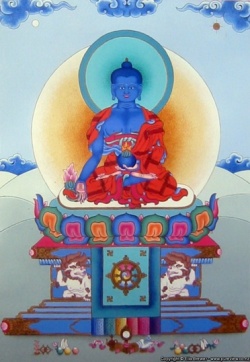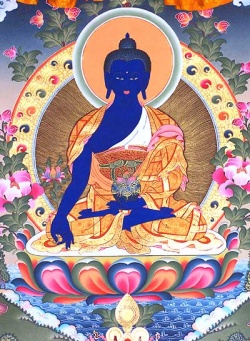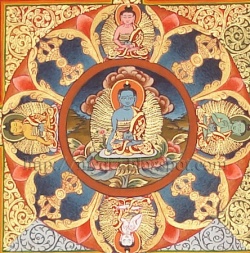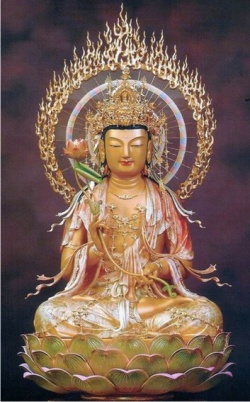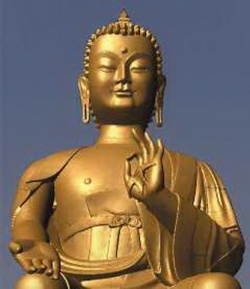Bhaisajyaguru Buddha
Click here to see other articles relating to word Bhaisajyaguru Buddha
I honour the Lord Master of Healing, the King of Lapis Lazuli Radiance, Tathagata, Arhat, Perfect Enlightened One, saying:
To the Healing, to the Healing, to the supreme Healing hail!""
The Dharani of The Healing Buddha ~
Medicine Buddha has made a vow to help those who call upon him when ill or injured, and to aid those who revere him to achieve a long and healthy Life.
As Amitabha is The Buddha of the Pure land of The Western Paradise, the Medicine Buddha is The Buddha of the Pure land of the Eastern Paradise.
Medicine Buddha is an Enlightened being who has unbiased Compassion for all living beings.
He protects living beings from physical and Mental sickness and other dangers and obstacles, and helps them to eradicate the Three poisons - Attachment, hatred, and Ignorance - which are the source of all sickness and danger. He is a Buddha Doctor.
Medicine Buddha's right hand rests on his right knee, palm outward in the gesture of giving realizations. His left hand rests in his lap, holding a nectar bowl of medicine that cures all ills, hindrances and obstacles.
Homage to the Lord Master of Healing
The Lord Master of Healing is also known as the Medicine Master Buddha Who Dispels Calamities and Lengthens Life.
More and more devotees are reciting his Dharani, seeking the Blessings and Compassion of the Medicine Master Buddha to help dispel their karmic obstacles, to free them from sufferings,
illnesses and Afflictions, and consequently lengthening their lives - hence this is A Mystic Formula for Dispelling Disease and Suffering.
This Healing Dharani, fervently recited 7 times or 49 times or 109 times depending on the situation - over a glass of plain water is able to relieve or heal a sick person.
On such an occasion, the above practice should be done daily (or a few times a day as the situation requires) until the sick person recovers.
Devotees who wish to uphold this Dharani should sincerely attempt to recite it everyday 3 times, 7 times or according to one’s Wisdom.
Medicine Master’s True Words
For Anointing The Crown
In Sanskrit
Namo bhagavate bhaisajyaguru-vaidurya
prabha-rajaya tathagataya arhate samyak-
sambuddhaya tadyatha. Om bhaisajye
bhaisajye bhaisajya-samudgate svaha!
This can be translated as:
"I honour the Lord Master of Healing, the King of Lapis Lazuli Radiance, Tathagata, Arhat, Perfect Enlightened One, saying:
To the Healing, to the Healing, to the supreme Healing hail!"
12 Vows of Medicine Buddha
1. I vow that my Body shall shine as beams of brilliant Light on this infinite and boundless World, showering on all beings, getting rid of their Ignorance and worries with my teachings.
May all beings be like me, with a perfect status and character, upright Mind and soul, and finally attaining Enlightenment like The Buddha.
2. I vow that my Body be like crystal, pure and flawless, radiating rays of splendid Light to every corner, brightening up and enlightening all beings with Wisdom.
With the Blessings of Compassion, may all beings strengthen their Spiritual Power and physical energy, so that they could fulfil their Dreams in the right track.
3. I vow that I shall grant by means of boundless Wisdom, all beings with the inexhaustible things that they require, and relieving them from all pains and Guilt resulting from materialistic desires.
Although clothing, Food, accommodation and transport are essentials, it should be utilized wisely as well.
Besides self-consumption, the remaining should be generously shared with the community so that all could live harmoniously together.
4. I vow to lead those who have gone astray back to the Path of righteousness. Let them be corrected and returned to The Buddha way for Enlightenment.
5. I vow that I shall enable all Sentient beings to observe precepts for Spiritual purity and Moral conduct.
Should there be any relapse or violation, they shall be guided for repentance.
Provided they truly regret their wrong-doings, and vow for a change with Constant prayers and strong Faith in The Buddha, they could receive the rays of Forgiveness, recover their lost Moral and purity.
6. I vow that all beings who are physically disabled or sick in all aspects be blessed with good health, both physically and mentally. All who pays homage to Buddha faithfully will be blessed.
7. I vow to relieve all pain and poverty of the very sick and poor.
The sick be cured, the helpless be helped, the poor be assisted.
8. I vow to help women who are undergoing sufferings and tortures and seeking for transformation into men.
By hearing my name, paying homage and praying, their wishes would be granted and ultimately attain Buddhahood.
9. I vow to free all beings from Evil thoughts and its control.
I shall lead them onto the Path of Light through inculcating them with righteousness and honour so that they will walk The Buddha way.
10. I vow to save prisoners who have genuinely repented and victims of natural disasters.
Those who are sincere will be blessed by my supreme powers and be freed from sufferings.
11. I vow to save those who suffer from starvation and those who committed Crime to obtain Food.
If they hear my name and faithfully cherish it, I shall lead them to the advantages of Dharma and favour them with best Food and eventually lead a tranquil and happy Life.
12. I vow to save those who suffer from poverty, tormented by mosquitoes and wasps day and night.
If they come across my name, cherish it with sincerity and practise Dharma to strengthen their merits, they will be able to achieve their wishes.
The Medicine Master Sutra
Thus I have heard. At one time the Bhagavan (The World Honored One, The Buddha) was travelling through many lands to transform living beings. He arrived at Vaishali and stayed beneath a grove of melodious trees.
With him were eight thousand great Bhikshus and thirty-six thousand Bodhisattvas, Mahasattvas, also kings, ministers, Brahmans, lay disciples, gods, Dragons, and the rest of the eightfold division.
An immeasurable great multitude of humans and non-humans respectfully surrounded him, and The Buddha spoke Dharma for them.
At that time, Manjushri, the Dharma Prince, received the awesome inspiration of The Buddha, rose from his seat, bared one of his shoulders, knelt on the ground on his right knee with his palms joined together, and reverently said to the Bhagavan,
We only wish that you would speak about Dharmas such as the Buddhas' names, the vast vows they made in the past, and their supreme Merit and Virtue, so that those who hear it will be rid of their karmic hindrances.
This request is also for the sake of bringing benefit and Joy to all Sentient beings who live in the Dharma-image age."
The Buddha told Manjushri, "Passing from here to the east, beyond Buddhalands numerous as the sand grains in ten Ganges Rivers, is a World called 'Pure Vaidurya.'
The Buddha there is named Medicine Master Vaidurya Light Tathagata)]; One Worthy of Offerings; Of Proper and Equal Enlightenment; Perfect in Clarity and Practice; Well Gone One; One Who Understands the World;
Unsurpassed Lord; Taming and Regulating Hero; Teacher of Gods and People; Buddha; Bhagavan.
Manjushri, when that Buddha, World Honored One, Medicine Master Vaidurya Light Tathagata, was practicing the Bodhisattva way, he made twelve great vows that enable all living beings to obtain what they seek.
"The sixth great vow:
'I vow that in the future when I attain Bodhi, to cause Sentient beings whose bodies are inferior and whose faculties are imperfect, who are ugly, dull, blind, deaf, dumb, mute, paralyzed, crippled, hunchbacked, leprous, insane, or have various other kinds of sicknesses and sufferings,
to become upright and intelligent upon hearing my name. May they all possess perfect faculties and be free of sickness and Suffering.'
"The seventh great vow:
'I vow that in the future when I attain Bodhi, to cause Sentient beings who are oppressed by many illnesses and who are without aid, without a place to turn, without a doctor, without medicine, without relatives, and without a family,
who are poverty stricken and filled with Suffering to be cured of all the various sicknesses upon having my name pass by their ear, so they are peaceful and happy in Body and Mind.
They will have a family and relatives, also acquire an abundance of property and Wealth, even to the point of certifying to unsurpassed Bodhi.'
"Moreover, Manjushri, when Medicine Master Vaidurya Light Tathagata attained perfect Enlightenment, by the Power of his past vows he contemplated all the Sentient beings who were Suffering from the many kinds of diseases, such as emaciation, paralysis, tuberculosis, biliousness, or fevers.
Some were afflicted by voodoo or by poisonous spells. Some died naturally when young, while others experienced a violent Death.
At that time, wishing to put an end to all these various sicknesses and sufferings, and to supply whatever those beings sought after, the World Honored One entered a Samadhi called "extinguishing the Suffering and distress of all living beings."
After he entered this Samadhi, a great Light came forth from his flesh-cowl. From amid that Light this magnificent Dharani rang forth:
"Namo bhagavate bhaishajya-Guru-vaidurya-prabha-rajaya, tathagataya arhate samyak-sambuddhaya tadyatha Om, bhaishajye bhaishajye-bhaishajya-samudgate svaha."
"Then, at the end of the Mantra that came forth from the Light, the earth trembled and emitted great Light. All living beings' sicknesses and sufferings were cast off, and they felt peaceful and happy.
"Manjushri, if you see a man or a woman who is undergoing sickness or Suffering, you should devote your efforts to purifying them.
Bathe them frequently, and rinse their mouths. Recite this Mantra over Food, medicine, or pure water that is free of insects.
Recite it one hundred and eight times and then give the Food, drink, medicine or water to the sick person, and tell him to take it.
All of their sicknesses and sufferings will disappear.
If anyone has a particular wish, he should also concentrate his Mind and recite this Mantra, then he will have his wish fulfilled.
He will enjoy a prolonged lifespan that is free of illness, and at the end of his Life, he will be reborn in The Buddha's Pure land. He will become irreversible, and will even attain Bodhi.
Ananda, this is the extremely profound practice of all Buddhas which is difficult to believe and to understand! You should know that your ability to accept this comes from the awesome Power of the Tathagata. Ananda!
All Sound Hearers, Conditionally Enlightened Ones, and the Bodhisattvas who have not yet ascended to the Grounds are incapable of believing and understanding this Dharma as it really is.
Only the Bodhisattvas who are destined in one Life (to attain Buddhahood), are capable of understanding.
When the Bhagavan had finished speaking, all the Bodhisattvas, Mahasattvas, the great Sound-Hearers, kings, ministers, Brahmans, lay-people, the gods,
Dragons, yakshas, gandharvas, Asuras, garudas, kinnaras, mahoragas, humans and non-human beings, and all the great assembly, on hearing what The Buddha had said, were deeply gladdened. They received it with Faith and respectfully practiced it.
End of the Sutra of the Merit and Virtue of the Past Vows of Medicine Master [[Vaidurya Light Tathagata.
Mania (rank of Buddha)
(The Supreme Physician)
(S.) Bhaysajaguru or Pindola.
(T.) sman-bla (pro. Mania) (supreme medicine).
(M.) ototi (prince of medicine) or bindwria (beryl).
(C.) Yao-shih-fo (Yao Shih Fo).
(J.) Yaku-shi and Binzura sama.
Mudra: vara (charity), dhyana (meditation).
Symbols: patra (begging-bowl), myrobalans (T. A-ru-ra, a golden fruit). 63
Colour: blue.
Mania, the Buddhist Aesculapius, is not only venerated in Tibet and Manchuria, but in China and Japan, where he is a most popular divinity.
He is called the 'Healing Buddha', and is said to dispense spiritual medicine when properly worshipped.
It is even believed in all these countries that an efficacious cure may be accomplished by merely touching the image.
In China he is worshipped under the name of 'Yao-shih-fo' (Bhaysajaguru), or Healing Teacher and Medical King.
He is the ruler of the Eastern world and has two attendants, the Bodhisattva, Ji-kwang-pien-chau and Yue-kwang-pien-chau, who are believed to assist him in removing all suffering.
In Japan, as Yaku-shi, he is sometimes counted among the five Dhyani-Buddhas, taking the place of either Vairocana or Akshobhya.
He is also one of the thirteen Buddhas of the Shingon sect, and is believed to look after the soul on the seventh week after death (v. Fudo).
Yaku-shi is always placed inside the temple, and may be found in a triad with Amitabha and Gautama Buddha.
There is a popular form of Yaku-shi in Japan called 'Binzura Sama', which is worshipped by the common people as a veritable fetish.
His head is usually covered by a hood, his hands with mittens, and there are often so many bibs around his neck, one on top of the other, that his face is scarcely visible.
He is looked upon as Pindola, one of the sixteen Japanese Rakhan (Arhats), and is always placed outside of the temple or principal shrine, for the following reason:
'According to popular Japanese tradition he was expelled from the Sixteen for having violated the vow of chastity by remarking upon the beauty of a woman, and hence his usual situation outside the temple.' (Satow.
It is also believed that, at Mania's request, the power of curing all ills was conferred on him by Gautama Buddha.
As a Buddha, he is represented with the urna, ushnisha, and short, curly hair.
He wears the monastic robe, and is seated with the legs crossed.
His left hand, lying in his lap in 'meditation' mudra, holds either a branch with the fruit, or the fruit alone, of the myrobalans, a medicinal plant found in India and other tropical countries.
The fruit resembles a lemon and is five-sided, (v. PI. lx, fig. c.)
In Tibet, as Bodhisattva, he wears the five-leaved crown as well as all the usual [Page 24] ornaments, and is represented in paintings rather than in bronzes.
In China and Japan, on the contrary, he is more usually found in bronzes; and while he wears the five-leaved crown, he is dressed like a Buddha and wears few ornaments.
His symbols and mudra are the same as his form as Buddha. If painted, he is blue.
There is a group of eight medical Tathagata who are believed to have created the medicinal plants, and Mania is the most popular of this group. 64 They figure in Pander's Pantheon des TscJmngtscha Hutuktu, and Mania is represented (No. 142) as a Buddha holding a branch of the myrobalans on which is the fruit.
If painted, three of the gods are red, and four yellow, while Mania is blue.
